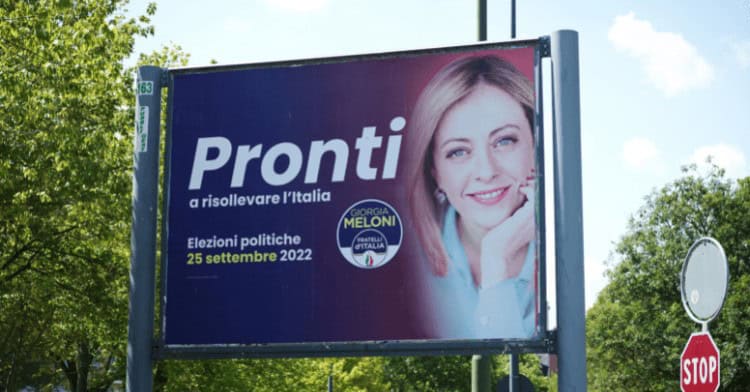Behind the anticipated far-right victory in Sunday’s elections lie trends of concern across Europe.

At least Italian elections are never boring. Indeed, they reveal much about Italian politics—as about the contemporary political challenges facing the European Union.
Mario Draghi having lost in July the near-unanimous parliamentary support for his premiership, including from the two populist parties, the Movimento Cinque Stelle (M5S) and the Lega, fresh elections take place on Sunday. After only a month of campaigning, polls indicate that the right-wing bloc of Fratelli d’Italia (FdI), Forza Italia and the Lega is on track to win a majority of seats, with about 40-45 per cent of the vote. Its leading force, FdI (Brothers of Italy), is a far-right party considered the natural successor to Alleanza Nazionale, which in turn emerged from the neo-fascist Movimento Sociale Italiano in the mid-1990s.
The legacy of historical transformations of Italian party politics in the last century still echoes in this round of elections. The mani pulite (clean hands) movement against political corruption of 1992-94, sparked after the April 1992 elections, brought a collapse of the government in 1993. What ensued was a ‘presidential government’, composed of unelected technocrats and led by Carlo Azeglio Ciampi, a former governor of the Bank of Italy.
‘Technopopulism’
This crisis of the ‘political logic’ represented the first strong sign of the ‘complete dismantling of the ideological awning’ under which Italian politics had sheltered since ‘the regulated conflict in the post-war period’. Once the political parties, principally Democrazia Christiana and the Partito Comunista Italiano, changed their purpose as the political arm of social groups, the social bonds with the societies were broken, and parties and party members started to perform very different roles, including that of ‘brokers’.
Party membership among workers started to decline, while a new middle class began to occupy power positions. Corruption and patronage on the part of what became labelled the partitocrazia remained widespread, triggering a social crisis which paved the way for the populist parties. The Maastricht treaty and eurozone membership, meanwhile, constrained democratically derived macroeconomic policies and brought the technocrats much closer to the domestic political arena.
These transformations, reflecting social fragmentation and the decline of party politics, brought a rupture which opened space for both the technocratic and populist dimensions of ‘technopopulism’. In 1994, the media magnate and owner of AC Milan, Silvio Berlusconi, with no political organisation behind him, won the election with a new movement, Forza Italia, echoing a football slogan. His strategy was very similar to what we witness nowadays—building a highly-personalised campaign as the only alternative to the political casta.
Recurring pitch
Berlusconi also claimed a personal ‘business’ competence—rather than any actual economic policies—which would somehow bring a miracle to ‘the people’: the honest, marginalised and poor. At 85 he is still campaigning and his pitch recurs in the campaign of Giorgia Meloni, a former minister in his government in 2008 and the founder of FdI in 2012. (Four ministers and eight state secretaries from that government of 2008-11 are now members of the Lega.)
Meloni is opposing the Reddito di cittadinanza (citizens’ income), claiming that the €9 billion allocated so far has been wrongly distributed—implying misuse of public money by the corrupt elite—and urging that the money be redistributed to the marginalised and vulnerable, low-income families. Her position on migration meanwhile reflects that of the Lega, led by the anti-immigrant Matteo Salvini. And the Reddito di cittadinanza can be presented as a policy of welfare chauvinism, which incorporates the logic of ‘neither left nor right’.
It was the signature policy which took M5S to victory in the 2018 elections. The M5S used it to present itself as a pro-social and pro-working-class party, committed to an essentially leftist agenda, and it proved extremely successful in rapidly building a mass support base covering the entire ideological spectrum. This highlights the two dimensions of technopopulism and how, in the absence of any clear strategy for tackling the rupture in the political system, it is associated with rule by populist parties or technocrats, or both.
Presidentialism
This protracted rupture has another consequence for national politics. Meloni has also pledged constitutional change vis-à-vis the president of the republic, so that a hitherto largely-ceremonial figure would no longer be elected by parliament but by the public. This pledge betrays the underlying societal conflicts, fractured party politics and unregulated partisan competition, which translate into rivalry over where final authority lies. Direct election of the presidency would obviously legitimise the exercise of power by the incumbent.
Such conflicts of sovereignty have been increasing across EU member states, taking us back once again to their historical origins. In the case of Italy, the 1992-94 caesura also marked a point of institutional transition from a parliamentary towards a presidential regime. The last president, Giorgio Napolitano, was the first to be re-elected for a second term, as earlier this year was his successor, Sergio Mattarella.
Since then, Italian presidents, including Mattarella, have exercised their authority as constitutional guardians on various occasions. They have granted mandates to coalitions to form governments, including the alliance between the populist parties in 2018; they have appointed un-elected technocrats, such as Dragi; and they have even vetoed the composition of a prospective government, as again in 2018.
Not unique
So alongside Italy’s decades-long tensions with the EU over fiscal policy, we see within the country competing claims to sovereignty—parliamentary, constitutional, popular—which are not unique to it. They reflect wider transformations of the political systems of EU member states, including the diminished oversight role of national parliaments in economic policies and the rise of the ‘regulatory state’.
In the absence of clear organisational reforms of political parties and the effective scrutiny which should expose the accountability chains of institutionalised power, exercised on behalf of ‘the people’, the parties will continue to end up in the same perpetual logic of doing politics and winning elections, increasingly detached from their citizens. Sunday’s elections do not thus promise any substantial change in Italian politics in the years ahead—but they will resonate across the continent.
Emilija Tudzarovska is a lecturer in contemporary European politics at Charles University in Prague and a researcher at the Czech Academy of Sciences, SOU. Her current research is part of NPO 'Systemic Risk Institute', funded by the EU.

